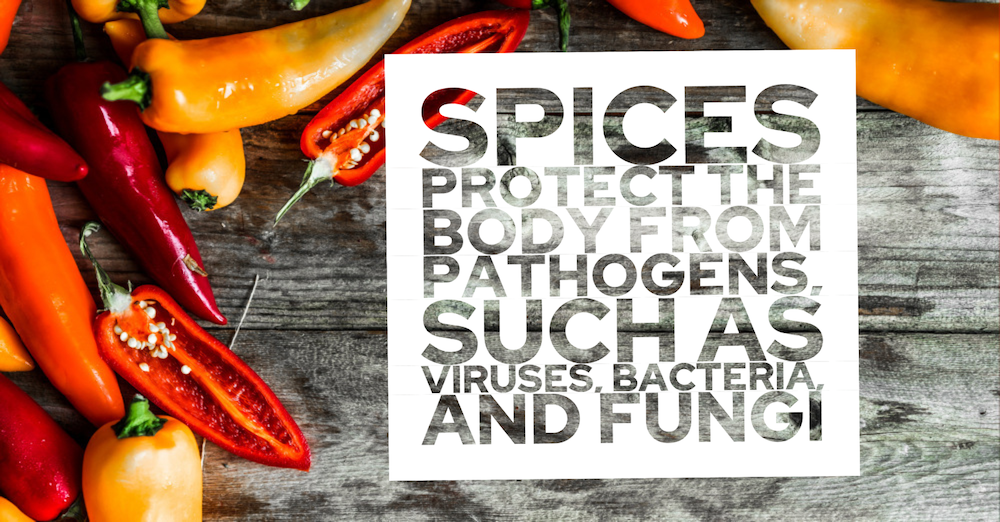
Manuel, a Mexican friend, eats spicy food to survive. He feeds himself chili peppers that would cause a flame of fire in the mouths of the most unsuspecting. At first glance, Manuel appears healthy, strong as a bull, and healthy. Once, when I asked him why he never fell ill, he confessed that “the key is the spice.” In my case, I once overate chili and ended up with heartburn and diarrhea for nearly a week.
Many of us are wary of spicy food because of our bad experiences. However, spices such as chili, pepper, turmeric, saffron, or curry can also be beneficial. Some studies say curry prevents degenerative diseases, and bell pepper improves cardiovascular disorders.
When hot peppers contact the oral mucosa, they have a burning sensation due to a chemical substance called capsaicin. Spice experts say this compound protects the body from harmful bacteria. The spices are in natural medicine for their antiseptic and anti-inflammatory properties. Spices speed up blood circulation, help you sweat, and improve digestion.
1 – The fountain of youth? The Chinese Academy of Medical Sciences says a well-spiced meal brings longer life expectancy. Researchers studied nearly half a million Chinese people for ten years to conclude that those who ate spicy dishes lived longer than those who ate only rice, chicken, and vegetables.
According to the authors of the research, these results demonstrate the protective effects of spicy foods on human health. Furthermore, they claim spicy foods reduce the risk of coronary heart and respiratory disease.
2 – Enemies of cancer? Spicy foods contain vitamins, minerals, pigments, and antioxidants, like quercetin, polyphenols, and curcumin. We know that antioxidants can help fight cell aging and prevent certain cancers. According to more studies, the spicy only attacks cancer cells without damaging the healthy cells surrounding the tumors.
3 – Blood pressure. Potent peppers are good for dilating blood vessels. Eating pepper is the best way to lower your blood pressure. In the case of hypertension, recommend avoiding salty dishes. Salt is not good when you want to lower your blood pressure.
Red bell pepper, black pepper, chili powder, cinnamon, paprika, curry powder, dry mustard, onion powder, and garlic powder are the most popular spices. They all add flavor and substitute salt.
4 – Anti-inflammatory and antiseptic virtues. Some spices are natural anti-inflammatories. In the case of rheumatism or arthritis, turmeric is highly effective. When it comes to muscle pain or headaches, ginger is almost miraculous. Cinnamon and cayenne bell pepper work on the central nervous system and the mechanisms of pain perception.
Spices also protect the body from pathogens, such as viruses, bacteria, and fungi. And this is true for cloves or cinnamon, rich in essential oils known for their anti-viral, antibacterial, and antifungal properties.
5 – Slimming effect. Spices are ideal against obesity, such as cinnamon. According to a study presented during the Scientific Sessions of the American Heart Association (AHA), cinnamon fights fat storage in the body. Spices provide a feeling of satiety that repels the moment you want to nibble. To keep in shape, consuming turmeric, curry, ginger, and cayenne pepper is recommended, allowing you to space out your meals and eliminate fat faster.
According to an article published in CyTa Journal of Food, spices burn calories and stimulate metabolism by increasing body heat. For this reason, they are suitable for weight loss. However, consult a doctor first before adopting a spicy diet.
The spices have some health benefits, but in moderation. A study conducted in Mexico (the world’s hot pepper center) shows that people who consume nine or more jalapeño peppers are more likely to develop stomach cancer.
❎ When is it not good to eat spicy food? It is not advisable to overdo it because it can irritate the gastric mucosa, but there are cases where you should take even more precautions. If you have liver or urinary tract problems, it is better to avoid its consumption. During pregnancy and breastfeeding, it can cause digestive complications. If you suffer from heartburn, hemorrhoids, and other problems related to the digestive tract, it is better to avoid it. Fatty and spicy food is linked to the appearance of acne.
The key is moderation. Adding too much spice to the diet makes the situation worse for those with a pre-existing condition, such as heartburn. It can also aggravate other digestive problems, such as gastritis or irritable bowel syndrome.
➡️ ENCYCLOPEDIA ONLINE >
